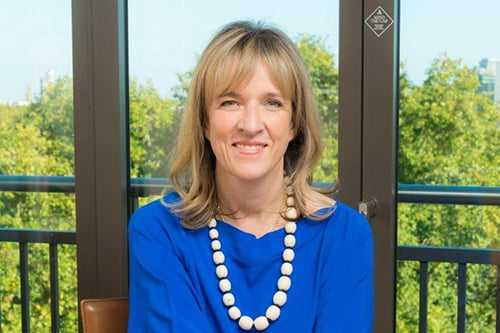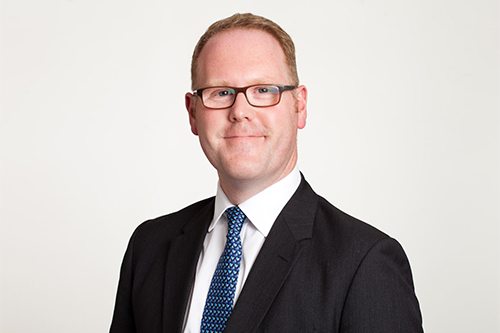

The value of professional indemnity (PI) insurance and the protection it offers against potential errors and omissions claims was emphasised recently when the British Insurance Brokers’ Association (BIBA) made a point of reminding insurance brokers not to forget about their own insurance policies, noting that the market has hardened.
In a recent discussion with Insurance Business, Tracy-Lee Kus (pictured above), the MD of financial and professional services at Aon, and Stuart Toal (pictured below), casualty account manager at Allianz, examined the impact that the COVID-19 crisis has had on the PI sector and the long-term effects the pandemic might have on the space. Kus noted that the trend of firming rates has been continuing for some time now.
“This is not COVID related,” she said, “and COVID has not accelerated firming of rates; it is a pricing revaluation after many years of under-pricing in conjunction with increased claims. What the pandemic has done is lead insurers to focus more on the financial robustness of clients. In the solicitors’ space, the insurance market has lobbied the Solicitors Regulatory Authority to remove certain clauses relating to payment of excesses and run-off premiums as the market is concerned that firms will not be able to meet their financial obligations.”
Meanwhile, Toal highlighted that one of the biggest impacts of the crisis has been on commercial insurance brokers. Clients are turning to the insurance market for clarification and to make claims, he said, often with an expectation that they are covered. Customers could possibly allege miss-selling or failure to place appropriate cover, in which case brokers need to make sure that all of their policies and procedures are being followed correctly.
Looking to the long-term impact, Kus emphasised the correlation between claims against professional advisors and poor economic performance. Economic downturns often see increased claims against professional advisors, especially solicitors and accountants, a couple of years on, as claimants look to find a ‘deep pocket’ to claim against.
“There is also increased risk from remote working, whether an enhanced cyber threat or the lack of supervision or training for more junior employees leads to errors and claims,” she said. “All of this could lead to events which result in increased claims for this class. We are also likely to see a declining exposure base across our clients next year as revenues decline – this will create a perfect storm of insurers wanting more premium, but clients having less income to pay.”
Toal noted that appetites may change and while some will see this as a new opportunity, others may pull back from underwriting or place certain exclusions on policies. It is hard to predict, he said, but given the specialist role the brokers have in advising and selling insurance cover it is possible that insuring insurance brokers may “become more of a niche or bespoke product.”
Looking beyond the exposures that brokers themselves face, Toal said, they can play an important role in helping clients think objectively about their businesses, designing appropriate risk management and outlining which levels of cover they need. With businesses returning to a new normal this is an opportune moment to go back to basics and reiterate what’s covered and what’s not. Brokers should use this as a time for education and for renewing relationships with clients.

“D&O liability insurance is becoming one of the most valuable risk transfer mechanisms,” he said. “The current economic uncertainty and increased regulatory scrutiny facing senior management is helping facilitate this. Entity employment practice liability is also becoming prominent in the SME space – this is usually an optional extension under a D&O policy. Brokers should ensure that clients are following HR procedures correctly as well as utilising HR consultants or legal advisors in case of any terminations.
“I can’t stress enough how important it is to keep lines of communication open. Really examine policy wording, be clear with clients and start renewals early to ensure a smooth process for everyone involved.”
Brokers who offer PI or D&O cover should have a strong focus on risk management to mitigate enhanced risks, Kus said, and must also foster realistic expectations about PI renewals, keeping open lines of communication to prepare the CFO for any expected pricing increases. Brokers should also emphasise the placement of insurance with carriers who have strong financial ratings as businesses should not look to save money by approaching less secure markets.
While PI is firming up, D&O is in a far more difficult position, Kus said. The market is seeing a sudden hardening due to claims, concerns about COVID-19 related insolvency and the impact of geographic trends. For D&O, businesses need to prepare their boards for the change in the market. Clients need to start renewals several months earlier and be very clear what they see as most important: premiums, policy wording, limits, etc.
“Brokers need to ensure they are working with their clients to differentiate themselves in this market, build strong relationships with carriers, help clients to understand how the claims process should work and also give boards the opportunity to deep dive the cover and prepare themselves for this changing market.”
Flexible and innovative broking approaches to minimise the effects of the firming market is key at this time, according to Kus. For Aon, communication of market updates, risk management advice from the brokerage’s team of risk management lawyers, and preparing clients with suitable responses to the questions they are likely to be asked by insurers is the most important support to be provided.
